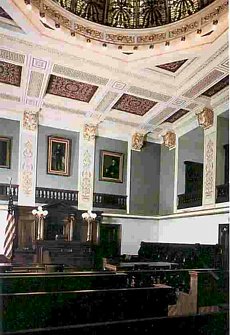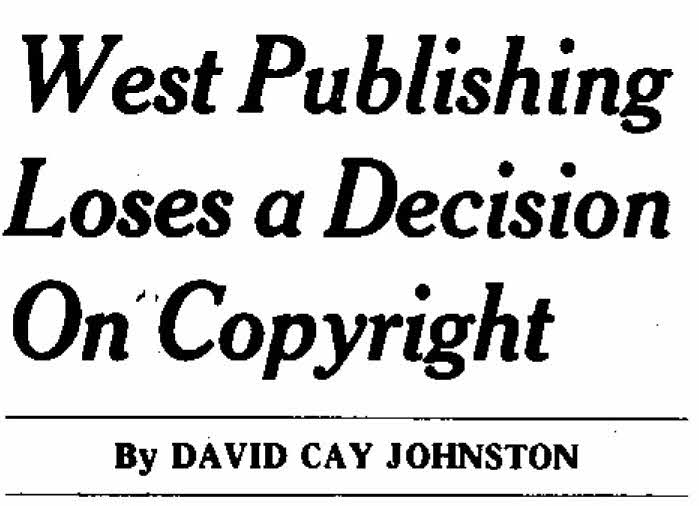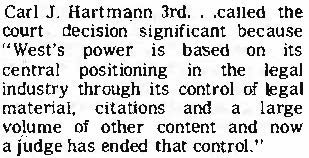| HOME | BACKGROUND | CASES | REFERENCES | PRESS | CONTACT US |

This is just one of nine different decisions through which West Publishing Company lost its copyright claims on both the TEXT and the CITATIONS to its National Reporter System. Judge Martin awarded HyperLaw's counsel $813,724.
"West used every effort to avoid an adjudication of its rights and to make it difficult for Hyperlaw to determine what portions of the reported opinions were in the public domain and could be freely copied. Moreover, West was not endeavoring to protect an original work of authorship which would clearly foster the purposes of the Copyright Act. It was asserting a copyright in a work consisting predominantly of the work of government agencies, i.e., the courts. " --Judge John Martin
On the appeal, West was represented by famous Harvard Law School Professor Arthur R. Miller.
The Second Circuit held: "The arrangement of cases in the West case reporters, however meticulous and thoughtful, is of small assistance to the primary use of these products--searching for cases, and retrieval. After all, the useful order of access is almost always determined by the research goal of each user rather than the publisher's sequencing (a compilation of law cases being not much like a musical medley or a sonnet sequence). And the primary use of West's pagination in plaintiffs' products is to allow the user to refer to the location of a particular text within the West case reporters as has become standard practice in the legal community. West concedes that use of its volume and page numbers for pinpoint citation purposes is at least a fair use (if it even amounts to actionable copying). There is no evidence that plaintiffs have encouraged the users of their products to reproduce West's arrangement. In fact, the CD-ROM products provide no easy means for using the star pagination to create a substantially similar arrangement; a user must retrieve each case, one at a time, in the order in which they appear in the West volume, [**32] and then print each one. What customer would want to perform this thankless toil? "
"West's conduct in affixing a general copyright notice to its work without delineating that portion that was not subject to copyright was exacerbated by the fact that every time Hyperlaw attempted to engage in a dialog with West to determine which elements in a judicial opinion West considered protectable, West rejected the effort and responded with platitudes that gave Hyperlaw no guidance as to where West claimed its copyright protection began or ended" |
|
LEAD TRIAL AND APPELLATE COUNSEL
UNITED STATES DISTRICT COURT FOR THE SOUTHERN DISTRICT OF NEW YORK
MATTHEW BENDER & COMPANY, INC., Plaintiff and HYPERLAW, INC., Intervenor-Plaintiff v. WEST PUBLISHING COMPANY and WEST PUBLISHING CORPORATION, Defendants. 94 Civ. 589 (JSM) 1999 U.S. Dist. LEXIS 19387 December 16, 1999 COUNSEL: For Plaintiff: Paul J. Ruskin, Law Offices of Paul J. Ruskin, Douglaston, NY. and Carl J. Hartmann, New York, NY For Defendants: James F. Rittinger, Satterlee Stephens Burke & Burke, New York, NY. OPINION AND ORDER
JOHN S. MARTIN, Jr., District Judge: This long and hard-fought battle over West's claim that it was entitled to copyright protection with respect to various court opinions that it published has reached its final stage. Hyperlaw, which prevailed on the merits, now seeks an order granting it attorney fees pursuant to Section 505 of the Copyright Act. 17 U.S.C. 505. The standard for awarding attorney's fees against a copyright holder was established by the Supreme Court in Fogerty v. Fantasy, Inc., 510 U.S. 517, 114 S. Ct. 1023, 127 L. Ed. 2d 455 (1994). In that case the Supreme Court rejected prior holdings in the circuit courts that copyright holders would be entitled to attorney's fees as a matter of course but that those challenging their claims would be held to a higher standard. The Supreme Court recognized [*2] that the purpose of the Copyright Act to "promote progress of science and the useful arts" can sometimes be served as well by actions challenging the assertion of copyright protection as it is by actions seeking to uphold a copyright. 114 S. Ct. at 1029. To guide the exercise of district court discretion regarding fee awards the Court cited a list of "nonexclusive factors" courts should consider: "frivolousness, motivation, objective unreasonableness (both in the factual and legal components of the case) and the need in particular circumstances to advance considerations of compensation and deterrence." Id. These factors "may be used to guide courts' discretion, so long as such factors are faithful to the purposes of the Copyright Act" and are applied evenhandedly to prevailing plaintiffs and prevailing defendants alike. Id. Since Fogerty, courts in the Second Circuit have generally focused on the objective unreasonableness of the losing party's position when deciding whether fees should be awarded. See e.g., EMI Catalogue v. CBS/Fox Company, 1996 U.S. Dist. LEXIS 7240, 1996 WL 280813, at *2 (S.D.N.Y. 1996); Langman Fabrics v. Samsung America, Inc., 997 F. Supp. 479, 481 (S.D.N.Y. 1998); [*3] Screenlife Establishment v. Tower Video, Inc., 868 F. Supp. 47, 50-52 (S.D.N.Y. 1994). West essentially argues that objective unreasonableness is the exclusive standard for awarding fees in this circuit, but no court has held that objective unreasonableness is anything other than one of the factors courts should consider when awarding fees. The bottom line is that awarding fees is left to the discretion of the trial court and such awards should be used to promote the purposes of the Copyright Act. See Fogerty at 1033 n.19. In this case, an award of attorney fees against West is appropriate to promote the purposes of the Copyright Act. Although there is some merit to West's argument that the dissent by Judge Sweet from the decision affirming this Court's ruling against West indicates that there was a non-frivolous basis for West's claims, that does not end the inquiry. An objectively unreasonable argument is not necessarily frivolous or made in bad faith. See Screenlife at 51; Williams v. Crichton, 891 F. Supp. 120, 121 (S.D.N.Y. 1994). The Court would be sympathetic to West's argument had West forthrightly recognized that there was an open [*4] question concerning its right to assert copyright protection in court opinions and cooperated in Hyperlaw's efforts to obtain a judicial resolution of that question. The record in this case demonstrates, however, that West used every effort to avoid an adjudication of its rights and to make it difficult for Hyperlaw to determine what portions of the reported opinions were in the public domain and could be freely copied. Moreover, West was not endeavoring to protect an original work of authorship which would clearly foster the purposes of the Copyright Act. It was asserting a copyright in a work consisting predominantly of the work of government agencies, i.e., the courts. Section 403 of the Copyright Act prohibits the assertion of copyright in a work consisting predominantly of federal government works unless the copyright notice identifies the portions that are not subject to copyright. See 17 U.S.C. 403. West's copyright notice states: "Copyright is not claimed as to any part of the original work prepared by a United States Government officer or employee as part of that person's official duties." West's conduct in this regard was the exact type of conduct [*5] which Section 403 was designed to prohibit:
H.R. Report No. 94-1476, 94 Cong. 2d Sess. 51 (1976). West's copyright notices failed to delineate that portion of the work as to which copyright protection was claimed and thereby discouraged dissemination of the work. HyperLaw's action vindicated the public interest in wide dissemination of federal judicial opinions. Therefore, it is within the Court's discretion to reward HyperLaw for those efforts by way of attorney fees. See generally Fogerty. West's conduct in affixing a general copyright notice to its work without delineating that portion that was not subject to copyright was exacerbated by the fact that every time Hyperlaw attempted to engage in a dialog with West to determine which elements [*6] in a judicial opinion West considered protectable, West rejected the effort and responded with platitudes that gave Hyperlaw no guidance as to where West claimed its copyright protection began or ended. When Hyperlaw was finally forced, as was another competitor, Matthew Bender, to seek the aid of the court in the form of a declaration as to which elements of the judicial opinions were in the public domain, West again strove mightily to prevent a judicial resolution of the question by arguing that the controversy was not justiciable. Thus, while the specific arguments that West ultimately advanced may not have been asserted in bad faith, i.e., were not known to be frivolous, its conduct of the litigation was. Given that its conduct in the litigation was coupled with violation of Section 403, it is totally appropriate to award Hyperlaw its reasonable attorney's fees in this case. The question that remains is whether the specific amount requested by Hyperlaw is reasonable. West makes three principal arguments with respect to the amount requested. First it argues that Hyperlaw should not be compensated for the time of its attorneys that was spent on issues on which HyperLaw did not [*7] prevail or with respect to claims that were withdrawn during the litigation. It is a rare litigation indeed in which every argument made on behalf of a party is accepted by the Court and there is no change in the theories on which a party relies to support its claim. Yet, clients are not billed only for the time spent on the successful motions or for only the time spent in developing the theory that ultimately prevails. When lawyers represent and bill clients they expect to be paid for all of their time and there is no reason why a party entitled to recover its attorneys' fees should be compensated on any different basis. Of course, if the time spent is unreasonably excessive it should not be paid for by either the client or the adversary. But such is not the case here. This was very hard fought litigation. While one might be able to say that some of the time spent by plaintiffs' counsel appears in hindsight to have been unnecessary, the Court is satisfied that the time spent on the case overall by plaintiff's counsel was reasonable. Second, West argues that HyperLaw's fee recovery should be limited to the actual amount the attorneys charged for their time and not a higher rate that [*8] might have been charged by other lawyers in similar cases. The Court agrees with West that HyperLaw should only recover the amount that it agreed to pay its attorneys and that neither HyperLaw or its counsel should receive a windfall of more than the actual rates charged. See F.H. Krear & Co. v. Nineteen Named Trustees, 810 F.2d 1250, 1269 (2d Cir. 1987); Lieb v. Topstone Industries, Inc., 788 F.2d 151, 156 (3d Cir. 1986); Warner Bros Inc. v. Dae Rim Trading, Inc., 695 F. Supp. 100, 110. Thus HyperLaw is entitled to recover at the actual rates charged by counsel during the years in question. Finally, West challenges HyperLaw's right to collect fees for its general counsel, Alan Sugarman. Their argument ignores case law in this circuit and others supporting such awards and finding that an hourly rate based on a fee charged by independent counsel for similar services can provide a reasonable basis for calculating such awards. See Broadcast Music, Inc. v. R Bar of Manhattan, Inc., 919 F. Supp. 656, 661 (S.D.N.Y. 1996); Perez v. Velez, 629 F. Supp. 734, 737-38 (S.D.N.Y. 1985); Pittsburgh Plate Glass Co. v. Fidelity and Casualty Co. of New York, 281 F.2d 538, 542 (3d Cir. 1960). [*9] Had Mr. Sugarman not done a significant portion of the work on this case the workload and consequently the fees for Messrs. Ruskin and Hartman would have been proportionally higher. There is no reason punish HyperLaw for choosing to have its general counsel do some of the work on this case. Mr. Sugarman's time was an asset the company could have used in other ways had he not been involved in this litigation. Mr. Sugarman maintained an active legal practice during the course of this litigation and charged his other clients $ 250 per hour. They apparently found this a reasonable rate for an attorney of his skill and experience, and so do I. Thus, I find the following rates and hours billed[1] for each of HyperLaw's three attorneys reasonable:
West is ordered to pay HyperLaw $ 813,724.25 in reasonable attorneys' fees for this action. [*10] SO ORDERED. Dated: New York, New York December 16, 1999 JOHN S. MARTIN, JR., U.S.D.J.
[1] n1 The hours billed also include those spent preparing HyperLaw's fee application. The Supreme Court and Second Circuit have found in other contexts that a fee award should usually include monies spent on the fee motion. See INS v. Jean, 496 U.S. 154, 161, 110 S. Ct. 2316, 2320, 110 L. Ed. 2d 134 (1990) (28 U.S.C. 2412); Weyant v. Okst, 1999 WL 1083702 (2d Cir. 1999) (42 U.S.C. 1888); Gagne v. Maher, 594 F.2d 336, 344 (2d Cir. 1979) 42 U.S.C. 1988). The Second Circuit has reasoned that denying fees for time spent obtaining them would "dilute the value of an award by forcing attorneys into extensive, uncompensated litigation in order to gain fees." Gagne at 344 (citation omitted). The same logic applies here. |
|||||||||||||||||||||||||||||||||||||||

.jpg)
